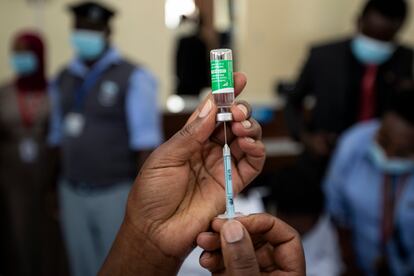Spain donates 326,400 Covid-19 vaccines to Ivory Coast
The low vaccination rate in Africa – where only 6% of the population is fully immunized – is considered a global threat given the risk of new coronavirus strains emerging

The first shipment of Covid-19 vaccines that Spain has donated to a sub-Saharan African country arrived on Thursday in Abidjan, the economic capital of Ivory Coast, which is also known as Côte d’Ivoire. The delivery contained 326,400 doses of the Oxford-AstraZeneca vaccine against Covid-19, along with another 98,400 shots of the same medication donated by Finland and 7,200 from Iceland. The donations are part of the public-private initiative Covax, which seeks to ensure that lower-income countries are not left behind in the global vaccination drive to curb the coronavirus pandemic.
Spain is the eighth vaccine donor in the world and the fourth in the European Union, according to a joint press release from Spanish and Ivory Coast authorities. The shots were received in Abidjan airport by Spain’s ministers for health and foreign affairs, the Spanish ambassador in Ivory Coast, Rafael Soriano, and representatives from Unicef, the World Health Organization (WHO) and the European Union delegation.
“It’s the first shipment of vaccines, within Covax, that Spain has made to sub-Saharan Africa, specifically, to a [Covax] member country that is a priority in the region, as is the case with Ivory Coast,” said Soriano. “This is the proof of the Spanish solidarity expressed through a multinational mechanism to respond to a global challenge. In this way, Spain wants to support the efforts of the Ivory Coast government to advance in its vaccination drive. Only together, and through a wide and global effort, will we be able to leave this pandemic behind us,” he said.
Thursday’s donation brings the number of Covid-19 vaccines donated by the EU to Ivory Coast to 1,950,000. The country is home to 27 million people, but just 3.2 million citizens Covid-19 vaccines have been administered, with just 900,000 fully vaccinated – the equivalent of 3.5% of the population. Authorities in Ivory Coast have announced that they want to vaccinate 60% of the population by the end of the year. But this figure is very ambitious given the slow pace of the vaccination drive, which is due to both vaccine shortages and hesitancy among some citizens to get immunized.
In September, during the General Assembly of the United Nations, Spanish Prime Minister Pedro Sánchez announced that Spain would donate 50 million Covid-19 vaccines to the world’s most disadvantaged countries: 30 million before the end of 2021 and another 20 million in the first quarter of 2022. All of these shots are being delivered via the Covax global initiative, which involves, among others, the WHO, Unicef and the vaccine alliance Gavi.
Few coronavirus cases detected
A total of 8.5 million coronavirus cases and 220,000 Covid-19 deaths have been recorded in Africa. These are surprisingly low figures given the continent is home to around 1.3 billion people. The WHO, however, warns that only one in seven infections has been detected in Africa, which has a high rate of asymptomatic cases given the continent’s relatively young population, and a limited ability to carry out testing. According to the WHO, around 60 million people in Africa have had the coronavirus, or 3.5% of the population, while 650,000 have died from the disease – a figure that is three times higher than the official death toll.
The low rate of diagnoses has made it difficult to clearly see where and how the virus is spreading, which is something authorities need to know if they are to strengthen their efforts in the most at-risk areas. But the main concern now is the low vaccination coverage in Africa, where only 6% of the population is fully vaccinated. The WHO has warned that this presents a big risk for the world, given that the virus will continue to spread and new variants could emerge. It is also a huge problem for Africa, as the pandemic continues to stall the continent’s economic recovery. The virus has brought growth to a standstill, widened inequality and increased poverty, particularly in the lowest-income countries, as has been highlighted by the World Bank.
Tu suscripción se está usando en otro dispositivo
¿Quieres añadir otro usuario a tu suscripción?
Si continúas leyendo en este dispositivo, no se podrá leer en el otro.
FlechaTu suscripción se está usando en otro dispositivo y solo puedes acceder a EL PAÍS desde un dispositivo a la vez.
Si quieres compartir tu cuenta, cambia tu suscripción a la modalidad Premium, así podrás añadir otro usuario. Cada uno accederá con su propia cuenta de email, lo que os permitirá personalizar vuestra experiencia en EL PAÍS.
¿Tienes una suscripción de empresa? Accede aquí para contratar más cuentas.
En el caso de no saber quién está usando tu cuenta, te recomendamos cambiar tu contraseña aquí.
Si decides continuar compartiendo tu cuenta, este mensaje se mostrará en tu dispositivo y en el de la otra persona que está usando tu cuenta de forma indefinida, afectando a tu experiencia de lectura. Puedes consultar aquí los términos y condiciones de la suscripción digital.









































